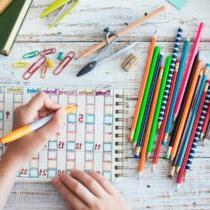
It’s hard to believe (and for some parents cannot come soon enough) that school will be starting up within a few weeks for most kids and teens. The back-to-school season can be exciting and challenging. A smooth transition helps families adjust well and thrive with the new school year. Here are some practical strategies to help your kids and teens (as well as you) prepare:
1. Help your child/teen make a plan and get any remaining summer assignments completed.
Divide up reading, math worksheets, etc. into parts and collaboratively plan out specific days and times that your child/teen can work on completing designated parts to complete the whole task before school begins.
2. Establish and Re-establish Routines:
- Help your child/teen to get back to a school day routine for bedtime and getting up if they have gotten into a different one (or none at all) over the summer. Gradually getting to bed and waking up earlier can ease the trouble with transitioning to a school bedtime and wake up routine.
- Review the weekly afterschool schedule of activities for the fall. Putting these on a calendar, whiteboard, or somewhere else where the adults and child/teen can easily see them makes planning easier.
- If you’ve been wanting to establish certain routines such as a weekly family meeting, no screen time at certain times, etc. the new school year is a great time to implement these (and make a plan to help sustain them).
- Make a plan for the morning routine, breakfast time, what roles kids/teens will have in packing themselves up for school and write these out together. Having a written checklist can be useful, especially for the first few days of school. Others may benefit from this long-term.
- In general, for important tasks, don’t rely on your memory (or expect your child/teen to do so). Writing down tasks and being able to view them in a list, app, etc. to potentially mark off each day (or at least mentally mark off at minimum) can greatly increase follow through.
- Simplify organizational strategies for making lunches.
3. Organize Your Spaces:
- Help your child/teen do a good cleaning of their room and organize things that need to be better maintained.
- Designate or re-establish a place for doing homework and make sure desks and homework areas are free from clutter as much as possible.
4. Communicate Openly:
- Encourage your child or teen to express any concerns or anxieties about the new school year.
- When feasible, identify concrete strategies that can be used to mitigate worries.
5. Develop Effective Homework Planning Habits:
Help your child/teen learn to plan out longer-term assignments by breaking them down into parts and scheduling times to work on them around any afterschool activities.
6. Foster Independence:
- Gradually increase your child and teen’s responsibilities each year in an age-appropriate manner to give them more autonomy. Within reason, don’t do things for them normally that they are fully capable of doing easily themselves (i.e., putting shoes by door, filling water bottle).
- Help them develop problem-solving and decision-making skills. When issues arise, talk through the problem, and guide them in identifying ways that they can make the situation/issue better. Rather than giving them suggestions from the start, let them share first what they think they can do and think for themselves with it.
7. Prioritize Mental and Physical Health:
- Ensure your child/teen gets enough sleep to the extent possible, eats nutritious meals, and stays physically active. For kids/teens who don’t get regular physical activity through extracurricular activities, blocking out time for physical activity daily (i.e., working out, bike riding) can be beneficial for many reasons.
- Encourage relaxation techniques like mindfulness or deep breathing exercises. If you have kids or teens who are willing to try these, consider doing them as a family. In general, keep them brief to start. For kids/teens who like sports, but wouldn’t consider trying these things if you suggest them, you could focus on breathing exercises in the context of mental preparation for sports.
- Address any mental health concerns (i.e., anxiety, depression) and seek professional help if needed.
8. Stay Positive and Supportive:
- Show interest in your child/teen’s schoolwork and activities, but don’t grill them just on what assignments they have. Get them talking by asking about specific projects or activities at school and frequent conversations will give you more information to make following up each day easier by knowing what is going on.
- Offer praise and encouragement for their efforts, but limit concrete rewards for things that they should be doing anyway (especially when they don’t need external motivation to do it).
Each child and teen are different, and thus the needs for each one will vary to some degree. The strategies presented here can be adjusted based on your own child/teen’s individual needs. Best of luck to your child/teen (and you) for a wonderful, enjoyable, and successful academic year.

































